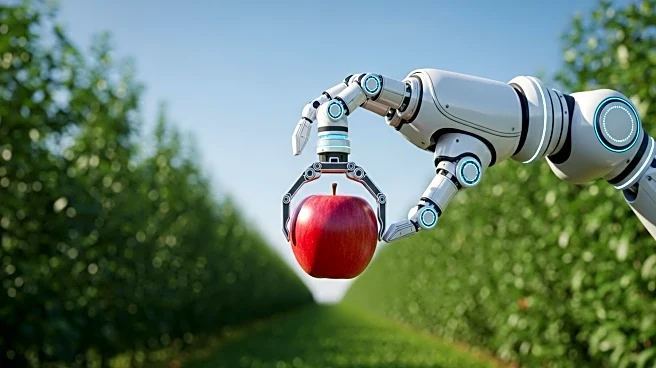What is the story about?
What's Happening?
A recent report from Purdue University, titled the August 2025 Consumer Food Insights report, reveals that U.S. consumers are cautiously optimistic about the use of artificial intelligence (AI) in food and agriculture production. The survey, which included over 1,200 adults, indicates that while 92% of consumers are at least slightly familiar with AI, their acceptance varies significantly depending on the application and demographic factors. The report highlights that consumer support is strongest for AI applications that enhance efficiency, such as reducing food waste on farms (72% support) and minimizing pesticide use through precise application (70% support). However, support diminishes for AI applications that impact labor, with only 44% backing AI that reduces labor reliance in harvesting. Trust in AI for food system decisions remains moderate, with food safety and nutrition advice receiving the highest confidence levels. Transparency is a critical factor, as 64% of consumers consider disclosure of AI use in food production to be very or extremely important.
Why It's Important?
The findings underscore the potential impact of AI on the U.S. food and agriculture sectors, which are increasingly integrating AI technologies to improve efficiency and sustainability. However, the trust gap identified in the report suggests that consumer acceptance is not guaranteed. Companies in these industries may face challenges in gaining consumer trust, particularly among older demographics who express skepticism about AI-assisted food products. This skepticism is largely due to concerns about food safety, a preference for traditional farming methods, and fears about the impact on food quality and naturalness. The report suggests that bridging this trust gap through enhanced transparency and education will be crucial for the successful adoption of AI in food systems. As AI continues to play a larger role in agriculture, addressing these consumer concerns will be essential to ensure widespread acceptance and to harness the full potential of AI technologies.
What's Next?
To address the trust issues highlighted in the report, companies in the food and agriculture sectors may need to implement more robust transparency and education strategies. This could involve clearer communication about how AI is used in food production and its benefits. Additionally, outreach efforts targeting older consumers, who are more skeptical of AI, could help alleviate concerns and increase acceptance. As AI technologies continue to evolve, ongoing consumer education will be necessary to keep pace with advancements and to ensure that implementation does not outstrip public understanding. The success of AI integration in agriculture will likely depend on the industry's ability to effectively communicate the safety, efficiency, and sustainability benefits of these technologies to a diverse consumer base.

















